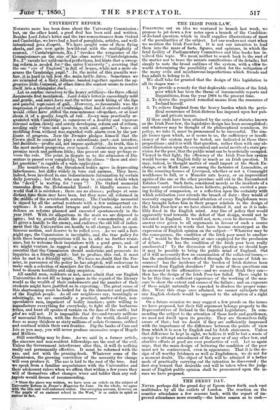UNIYERSITY REFORM.
NorniNG more has been done about the University Commission ; but, on the other hand, a good deal has been said and written. Besides Lord John's letter and the two remonstrances from. Oxford and CaMbridge, we hive had a host of pamphlets, articles, and well- intentioned. jeux Rceprit..,,,WeihaveAtught some of these flying eh 9qt% And no:71104a ;with the multiplicity of affltnak,I, !,1`,Cantabrigiensisi ;AO. 1 " invokes they,yengeanee :of, the imPs';'-i'94 141- 444 of 140 4440, wader ;, `Cantabrigiensis, orr r enlished,: pedectinntifilmthints that a sweep- ing refinuA,, -444: ;kit FeitteinTirikersity " ; averring that the one "eye o Englaird,r4Alt, of „lipanisovhile not a mete ob- Avf Canklavide,NOLTI,fikOhoiplidAtiftt this gae.Rilla war- 4hiA kii;tY11410,W *oi(MaAufktt]k&ircs, ometinaes wo . 7bitui49datog#thR against the ag- .fraftspre,__,A fit4m4,440fte, Of40§4 WIUS to resolve into Ain f,f )en 1.18.414 . 4441TAIMA*Pike-4447,XtillOrar7–the duce ofileial nto, Rentinell./05-444044 114tkriie,eikeeedingly mild gentle ilhay,499titnwaiter nni ch ihiting of the,li =a lamful reVeN01;t ookowevienakiitonnrnble- was-ithe impression it predimedjati' thalskad,,,ittargiced. earlier it yould either Iume' Aiifled theireinonatiaumal altogether, or at least 49.1F it et' a. eggy,).033g.tb„ft,t.t.Q.,,FweivStxtuoif:praetically tte- Vailited nith, *ph Tidga. oegkee,i,ous oft.,444thy and vigorous antern,a1 aetieu,*14.4441-aiirgibl,i0e-hVin RehrM out of reform, peeling 0111.3' Slia..41141c1,flOWfeitu...work Alutr4protO ; home. all AecOliag Tifggtztlrailmli*th olurmi (wen by the par- tisans of, progren4.,, r Ow.thg ,Xcenimr. Ipieflgef, ,IiitneeLf, that the Crown shall be istnifienttto (pjam a snlierthne4e,pertmnot, interfere, but .facilitate 32} Poot truth, this is the most mppeows,matiawail,i rCo umissiens in general this Feeerl t cue MAY perhaps re- verse the rule. The poigt,Aus diapato astouthe anission of Die- 45Pl#Prs is Passed over ,celnpletelyi but theiplause " these and simi- J0-questious" is eapabla fifATIN541.9.:4104401i.- ,„The manifestees of theArteifienabocjks, agree in deprecating rference, but differ widelyjn tone and animas. They have, eed, been involved in one indiscriminate fulmination by certain tinily journals; but then, who pan stop to examine details when the " devil is waiting for copy ", The Oxford memorial emanates from the Hebdomadal Board : it blandly assures the world that it is mistaken ; there, are no abuseS ; perhaps at some distant time there may have been, but they were all reformed in the Imiddle of the seyeuteenth„eentury. The Cambridge memorial is signed by all the aetual residents with a few unimportant ex- captions : it is somewhat brosque and impetuous and rests its defence on reforms planned and executed spontaneously in the year 1849. With* .allegations in the main we are disposed to agree; but , greatly doubt the policy of remonstrating at all. It gives a handle, to the enemy, and endorses the old bill of indict- mcnt that the Universities are hostile to all amine, have no spon- taneous motion, and deserve to be rolled over. we said, a fort- night ago, the Commission is inevitable, and the. true. policy for both these learned couorations wall ,he to offer. no Slather resist- ance, hut, to welcome their inquisitors with a good• grace, and—if we might ventuce,kri euggest---a god:. dinner It is most essential that they (PMAPsi9n should undertaheland prosecute its inquiries in a triell+gykyvirit ; but to produce this end, it must also be met in, a friendly spirit. We have no doubt, that the Pre- mier, in pursuance: et the; policy ho has adopted, will endeavour to make such a ,selection. of ineinhars,.for, the Commission as will, best
tend to disarm hcetility ,alleerianoTiaion-
I All candid men,, residents or not,: must admit that. our English Universities do not fill so largo a space in the regard of the literary world as the wealth of their endoWments and the number of their students might have justified ma in expeetingg „,-The.great cause of this shortcoming, must be looked for IA the character and position of the English people. As all our neighbours say, tauntingly or admiringly, we are essentially a medico]; matter-of-fact, non- speculative race, impatient of bodily inaction ; quite willing to manufacture everything for everybody, tofight all the barbarous tribes, and hunt all species of vermin on the fAce of the earth ; but plod we will not. It is impossible that five-and-twenty millions of mercurial Britons, with- the freedom of the world, should pro- duce as many thiniters as sixty millions of sedate Germans, cribbed and confined within their own frontier. Dig the banks of bare and Isis as you may, you will never produce successive crops of Hegels and Miillers.
Still something may be done. As we said in a former article, the sinecure and non-resident fellowships are the root of the evil. Unless the Government interference alter this, it will do nothing really and permanently effective. It must be reformed with the axe, and not with the pruning-hook. Whatever come of the ,Commission, the growing conviction of the necessity for change Will soon produce it. The axe is laid to the root of the tree. And we speak from a familiar acquaintance with the Universities and their adolescent Tillers when we affirm that within a few years they Will of themselves effect changes wiser and bolder than any red- tapists would dream of recommending.
* Since the above was written, we have seen an article on the subject of University Reform in Fraser's Magazine for Stine. On the whole, we agree with the able and well-informed writer. One sweeping sarcasm, however, on " the pupils of an eminent school in the West,' is as unfair in spirit as untrue in fact.


























 Previous page
Previous page